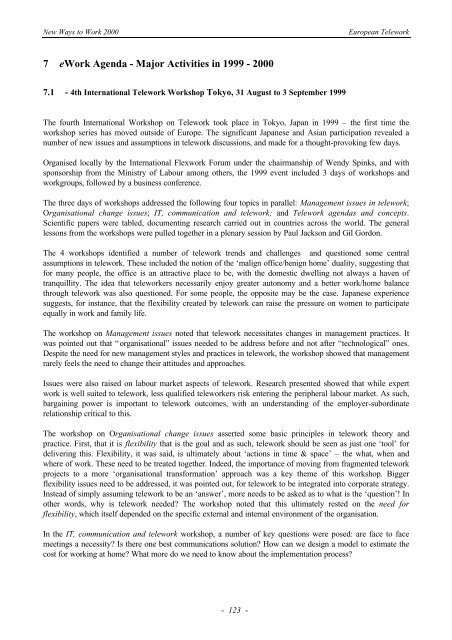eWORK 2000 - European Telework Week
eWORK 2000 - European Telework Week
eWORK 2000 - European Telework Week
- No tags were found...
You also want an ePaper? Increase the reach of your titles
YUMPU automatically turns print PDFs into web optimized ePapers that Google loves.
New Ways to Work <strong>2000</strong><strong>European</strong> <strong>Telework</strong>7 eWork Agenda - Major Activities in 1999 - <strong>2000</strong>7.1 - 4th International <strong>Telework</strong> Workshop Tokyo, 31 August to 3 September 1999The fourth International Workshop on <strong>Telework</strong> took place in Tokyo, Japan in 1999 – the first time theworkshop series has moved outside of Europe. The significant Japanese and Asian participation revealed anumber of new issues and assumptions in telework discussions, and made for a thought-provoking few days.Organised locally by the International Flexwork Forum under the chairmanship of Wendy Spinks, and withsponsorship from the Ministry of Labour among others, the 1999 event included 3 days of workshops andworkgroups, followed by a business conference.The three days of workshops addressed the following four topics in parallel: Management issues in telework;Organisational change issues; IT, communication and telework; and <strong>Telework</strong> agendas and concepts.Scientific papers were tabled, documenting research carried out in countries across the world. The generallessons from the workshops were pulled together in a plenary session by Paul Jackson and Gil Gordon.The 4 workshops identified a number of telework trends and challenges and questioned some centralassumptions in telework. These included the notion of the ‘malign office/benign home’ duality, suggesting thatfor many people, the office is an attractive place to be, with the domestic dwelling not always a haven oftranquillity. The idea that teleworkers necessarily enjoy greater autonomy and a better work/home balancethrough telework was also questioned. For some people, the opposite may be the case. Japanese experiencesuggests, for instance, that the flexibility created by telework can raise the pressure on women to participateequally in work and family life.The workshop on Management issues noted that telework necessitates changes in management practices. Itwas pointed out that “organisational” issues needed to be address before and not after “technological” ones.Despite the need for new management styles and practices in telework, the workshop showed that managementrarely feels the need to change their attitudes and approaches.Issues were also raised on labour market aspects of telework. Research presented showed that while expertwork is well suited to telework, less qualified teleworkers risk entering the peripheral labour market. As such,bargaining power is important to telework outcomes, with an understanding of the employer-subordinaterelationship critical to this.The workshop on Organisational change issues asserted some basic principles in telework theory andpractice. First, that it is flexibility that is the goal and as such, telework should be seen as just one ‘tool’ fordelivering this. Flexibility, it was said, is ultimately about ‘actions in time & space’ – the what, when andwhere of work. These need to be treated together. Indeed, the importance of moving from fragmented teleworkprojects to a more ‘organisational transformation’ approach was a key theme of this workshop. Biggerflexibility issues need to be addressed, it was pointed out, for telework to be integrated into corporate strategy.Instead of simply assuming telework to be an ‘answer’, more needs to be asked as to what is the ‘question’! Inother words, why is telework needed? The workshop noted that this ultimately rested on the need forflexibility, which itself depended on the specific external and internal environment of the organisation.In the IT, communication and telework workshop, a number of key questions were posed: are face to facemeetings a necessity? Is there one best communications solution? How can we design a model to estimate thecost for working at home? What more do we need to know about the implementation process?- 123 -








